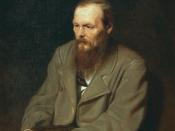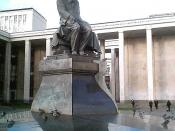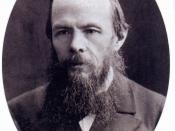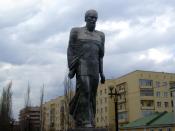Essay Dostoevsky's short stories talk about hope and religion. They cover the spectrum of having no hope once it is lost, to the belief that hope, once lost, can be regained through a belief in God, and finally, to the belief that man is accountable for his actions.
In The Christmas Tree and a Wedding, all hope is lost and can't be regained. The character, Julian Mastakovich, had no morals throughout the story. He married a girl when she was only 16, having met her at 11, and chose her to be his wife only because of her inheritance. In doing this, he ruined the rest of her life without having any remorse. "The once beautiful girl was sad and pale. She looked about her without interest."ÃÂ This once innocent 11-year-old girl was taken to marry a man who had no real love for her and, because there was no love bonding the two of them, hope was lost the day she married Mastakovich.
In the short story The Dream of a Ridiculous Man, hope can be lost but regained due to man's invention of "religion"ÃÂ. Throughout the story, the narrator talks about the truth of the world. Dostoevsky writes, "Religions were founded to propagate the cult of non-existence and self destruction for the sake of the ever peace of nothingness."ÃÂ To arrange order in the world, people created a belief in god.
When facing reality, life can sometimes seem to be pathetic. Most people see the world in a positive way or in a way they convince themselves is good. Dostoevsky emphasizes that hope is regained by religion, something people make up in order to have hope in life, something they convince themselves is true throughout many years to keep sanity stable. The closer people are to the truth, the harder life is.
In The Honest Thief, the thief believes he will be punished for his sins, thus he repents. He believes the truth is if one sins, there will be a punishment. The character Astafy says, "There is no hope, it seems, for either of us, Yemelyan, old fellow. The good lord must be punishing us for our sins!"ÃÂ Even while convinced of a god, facing the idea of being punished scares them and makes people want to repent.
Hope, religion, and repentance are themes running throughout Dostoevsky's stories. They intertwine and mingle with each other in subtle ways that reveal their presence in daily life, and are well illustrated in the lives of the characters he portrays in his stories. Dostoevsky shows us that religion and repentance can bring hope alive.





